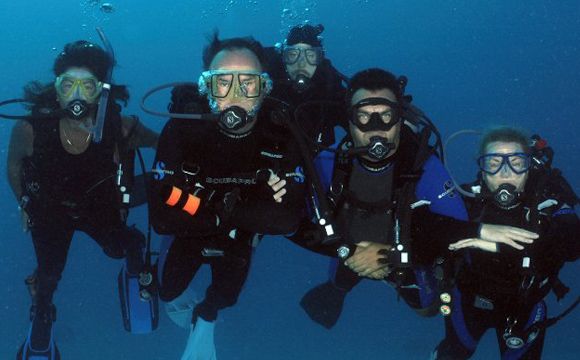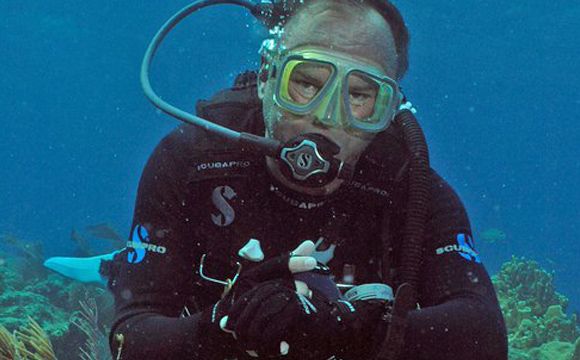
SCUBAPRO Deep Elite Team - Michael Lang
Michael Lang
Amongst diving professionals, the name Michael Lang is well-known and frequently spoken. His pursuit of safe diving protocols in the science world led him to discover SCUBAPRO early on in his career. He's been around the world several times over and has trained thousands of scientific divers. He directed the Smithsonian Scientific Diving Program for 21 years and the US Antarctic Diving Program for the National Science Foundation for 10 years. He also sits on the Divers Alert Network Board and is a Senior Fellow at The Ocean Foundation. Besides marine research, his interests are in parameters of extreme environment diving. He currently is Vice President of OxyHeal Health Group in San Diego, a hyperbaric chamber medical device manufacturer. No one is more qualified to judge reliable, high performance diving gear, and we are honored his brand of choice for more than 30 years has been SCUBAPRO.

An interview with Dr. Michael Lang:
Tell us about yourself:
"My name is Michael Lang, I'm an environmental physiologist, though originally, my career started as a marine biologist. I have dived the world several times over, all seven continents and the water surrounding them from poles to remote tropics. I started my professional career and scientific diving in California. I worked at San Diego State University as a marine biologist for 8 years and was then recruited by the Smithsonian Institution in Washington DC to organize its scientific diving program. For 10 years, I also managed the US Antarctic diving program for the National Science Foundation and was tasked with making sure that the scientists that received funding from the National Science Foundation under ice were properly trained and had the right equipment."
Why did you decide to take the giant stride into the oceans?
I decided early on growing up during summers on the Mediterranean coast of Italy (not coincidentally close to the Oceanographic Museum and Aquarium in Monaco), that I wanted to be a marine biologist. Soon it became clear that in order to study the marine environment, you really had to be fully immersed in it. To study a kelp forest or get in and examine the behavior and ecology of octopuses, you really have to get in and put on a mask, get in the water, collect the data, make the observations, take the pictures, etc. So, it became a research tool early on. My objective was to become the best possible diver myself so that I could focus on the research tasks and not have to worry about diving safety." I furthered my education with a scuba instructor certification in 1980.

How has diving changed your life?
"Diving has enabled my career. It started as a curiosity and the ability to discover new things but it became an incredibly valuable work tool. I was able to dive in so many different environments and so many different oceans, atolls and remote sites that I got a better appreciation of the diversity of dive sites and aquatic life.
Because I wanted to be a great diver, I went through a progression of recreational courses, became an instructor and then felt the need to train other scientists to dive well to ensure they were doing an effective and safe job. The payoff I think has been really good, if you look at the scientific literature of studies done using SCUBA that couldn't have otherwise been done. It is without question a significant value-added tool in my - and our collective - research toolbox."
Tell me what, if you had to pick one of the most amazing experiences underwater, what would it be?
"I have logged over 5300 dives not to mention documented sites, depths, and animals around the world. But I will never forget the early work I did with shallow-water benthic octopods - to me the most interesting organisms under water. Their behavior, diversity, ability to mimic other organisms in self-defense or camouflage mode, and short action-packed life in the kelp forests and tropical reefs are all fascinating."
Where are some of your favorite places underwater?
"One of the special places for me was McMurdo Station in the Antarctic because of its uniqueness, the extreme visibility, the logistics needed to be able to dive and work there, the mechanics of drilling a hole through 6 meters of fast ice to get to the water beneath it, the thermal protection issues below and topside - a very adventurous place. It is a very infrequently dived site but the rewards are tremendous and the sounds and sights of ice from below are just incredible. The Weddell seals live there year round, and emit vocalizations that echo from depths and bounce off the ice sheet on the surface and the glacier walls under water. Penguins swimming by, giant underwater sea spiders, and giant Isopods added to the mix makes this special place a biologist's dream to study diversity and adaptation. In general the Antarctic is worthy of conservation as a global priority."
What is your advice to someone considering diving?
"If you want diving for life as a hobby, don't do it for work in order to keep your enthusiasm, interest level and fun factor up. On the other hand so much valuable work can be done as either a scientific diver, public safety diver, a commercial diver, you may want to consider it pursuing a diving-related career. These different types of activities have different missions and but provide a valuable public service. Without diving we would stop our activities at land's edge and not know what is going on under the water. If you want to keep diving for fun, good on you! Travel, leave nothing but bubbles and enjoy the underwater environment! But either way, dive in."
What is the favorite thing in your dive bag?
"The SCUBAPRO integrated Air II is great. The Air II has a lot of advantages over an Octopus. It eliminates another hose and has a multi-function use as a BC inflator. I like it because it streamlines gear well and was a required standardized piece of equipment for all our science diving programs. A close second is my Galileo Sol dive computer…perfect."
Why SCUBAPRO?
"My selection of SCUBAPRO and my long affiliation with this product was fortuitously spawned by my first regulator - a Mark V - in 1978. When I first learned to dive, it was on SCUBAPRO equipment. Thanks to their reliable products, connections and support, we used SCUBAPRO products exclusively at San Diego State University and when I moved to the Smithsonian Institution, it was the brand that I brought to the diving program. Life support equipment is important under water unless we grow gills behind our ears. We need to breathe air and when you look at the performance characteristics, SCUBAPRO has always produced a high performance life-support, breathing apparatus. Regulators have been tested by the United States Navy which consistently places SCUBAPRO in their Class A designation with the best performance characteristics and reliability. One is reminded when diving in very remote sites that there is no dive shop around the corner. We have got to be able to rely on our regulators' performance and reliability."
What does diving mean to you?
"Divers, be it scientific divers or recreational divers, are citizens of the world who see and experience the underwater environment and thus can have a direct impact on marine conservation and the protection of these natural resources for future generations. Diving also means adventure, exploration and incredible expeditions. When I think back on some of the things we have done like filming a 3D IMAX movie in the Galapagos while retracing the footsteps of Darwin, or diving remote places no one ever sees like Clipperton Atoll 600 miles West of Acapulco, Mexico or Kingman Reef and Palmyra Atoll 1,000 miles South of Hawaii and making amazing discoveries. Exploring the fascinating Arctic Ocean around the Svalbard archipelago or studying the organisms of the Antarctic continent are other highlights. More than just exploration, some of the discoveries that we've made in these places validate the uniqueness of these environments and why they warrant protection - which is incredibly important to me and my peers. '
Why encourage more people to dive?
Through my diving career, I have witnessed quite a few changes. I think the diving industry as a whole has done a fairly good job of bringing the plight of coral reefs and the need for conservation to the forefront. Divers are great ambassadors; they are the ones under water who are actually seeing the change and are in the best position to mitigate it.





